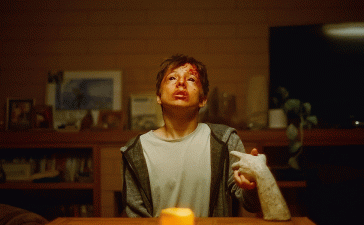Our film critic Travis Johnson looks at the year’s most divisive film and finds … nothing much.
Yes, I watched ‘Sound of Freedom’. Icon sent out a digital link for critics, I fired it up, and after the credits rolled my immediate thought was, “If this flick wasn’t being used as a battleground in the Great Culture War this week, I’d forget I ever saw it within six months.”
Which is not to say that ‘Sound of Freedom’ is terrible; nor is it great. It sits right at the apex of the quality bell curve, and whether it skews left or right of the median line depends strongly on your taste in self-serious exploitation thrillers. You know, the kind of thing you find a few layers deep in your Netflix recommendations or, back in the day, snagged from the weekly section of your local video store to round out a package deal.
But it is based on a true story, more or less, that of Homeland Security Agent-turned-anti-trafficking crusader Tim Ballard (Jim Caviezel), following him as his disgust at the horrific crimes against children he sees in the course of his job drives him to take a direct hand in matters.
The real Tim Ballard founded (and subsequently left earlier this year) the controversial anti-trafficking organisation Operation Underground Railroad. In the film, directed and co-written (with Rob Barr) by faith-film specialist Alejandro Monteverde, he sets off to rescue two young Honduran children from sex slavers, with the full support of his wife, Katherine (Oscar winner Mira Sorvino in a small and thankless role), and the help of former cartel flunky Vampiro (Bill Camp), who now uses his insider knowledge to help rescue trafficked kids.
Which sounds like the sort of thing you’ll like if you like that sort of thing. As a film, ‘Sound of Freedom’ is a little too long, a little too flat, and a little too obsessed with long, lingering shots of the faces of children about to experience something unspeakable (the cinematography by Gorka Gómez and Andreu Aec is quite good, it must be said). Looked at in isolation, it’s a lower-case-c conservative film, sure, but most action thrillers are and besides, demanding your cinema matches your politics and ideology is a mug’s game. Ballard’s Mormon faith is occasionally highlighted, but not aggressively.
Looked at in the current cultural context, however, and it’s impossible to ignore how it’s become a rallying cry for a broad swathe of the far right, including Trump, evangelical Christians of various stripes, and – most troublingly — QAnon conspiracists.
Not that the film itself endorses that particular brand of crazy. Nobody in the film is shouting WWG1WGA or rambling about adrenochrome harvesting, although Caviezel has been known to in his personal time, while Ballard himself endorsed the frankly bonkers theory that online furniture retailer Wayfair was a front for trafficking. You could credibly suspect that some of the more troubling beliefs of the film’s subject and star might at least bleed into the finished product a little, but Monteverde swears it’s not so, and has distanced himself from the furore, noting, “I’m not into politics and anything that divides. I’m an artist and a storyteller.” As Pepe the Frog cartoonist Mark Furie knows all too well, sometimes your work draws fans you’d rather it didn’t.
But if we take it on faith that the production itself is untainted, distributor Angel Studios has certainly embraced the language and posture of the PizzaGate crowd when it comes to marketing the film. Crowdfunding US$5m for promotional and distribution purposes, the Utah based faith film factory has positioned ‘Sound of Freedom’ not as a film to be watched, but a call to be heeded – perhaps a cause deplorable? Ultra-conservative Catholic filmmaker Mel Gibson, whose company, Icon Films, is handling Australian distro, touted the film in a clip that has since become the flavour base for thousands of conspiratorial video remixes, averring that the first step to eradicating child trafficking is awareness (fair) and that viewers should go see ‘Sound of Freedom’ (hang on…). If you watch the film, you’ll see Caviezel appear on screen during the end credits, exhorting viewers to spread the word, – ideally by employing Angel Studios; “pay it forward” system that lets them buy tickets for friends and relatives. How many of those tickets get used is up for debate, but it certainly hasn’t hurt movie’s box office. Weirdly, opinions seem divided on its Australian take – The Numbers has it comfortably at number two on the chart with $1.8m, while Box Office Mojo reports no take at all. Shall we take the average? No, it’s clear there is an audience for this, and they surely showed up for opening weekend.
And look: I get it. Child sexual abuse and trafficking is a hot button topic. It should be – and normally is – a bipartisan issue, but political tribalism in general (and far right conspiratorial nonsense) have muddied that. It’s an emotional issue – confronted with it, it’s impossible not to feel a sense of outrage on a gut level.
That outrage, however, can be repurposed for harmful intent – the whole “groomer” panic currently being stoked by right wing pundits is a textbook example. Protecting children is a natural instinct, and the idea that someone might do evil unto kids is often enough to drive people to choices that, looked at in the cold light of day, are wildly reactionary. Or to put it another way, if you’ve ever protested a drag story time or a queer school ball, the most charitable interpretation is you’ve been led astray by bad faith actors on a leash of your own good intentions.
People susceptible to that are ‘Sound of Freedom’s target demographic, and promoting the film as a true story makes it easier to swallow uncritically. But the fact is that Ballard’s story has been heavily fictionalised – check the OUR website, where a single blog post details the film’s diversions from fact. The most cogent point (and last on the list) is this: the film does not accurately depict how human trafficking rings operate.
Right.
So, if we’re not being shown an accurate depiction of the issue at hand, and if the actual details of Ballard’s work are being obscured and/or misrepresented, what awareness is being raised? What message is being spread? What, essentially, is the purpose of this film?
For sure, every drama based on actual events makes choices in terms of what to show and what to hide, what to enact and what to elide, as do documentaries. It behoves the viewer to do a little background work to parse real events from dramatic construction. Oppenheimer, for example, is based on true events, and while we don’t know if the father of the atomic bomb ever quoted the Bhagavad Gita while banging his Communist girlfriend (in fact, almost certainly not) that narrative invention both adds thematic depth and doesn’t wildly veer from or misconstrue the established facts of the man’s life. That’s fair play.
But we know that Tim Ballard never mounted a one-man rescue operation in the Colombian jungle, and her certainly didn’t kill anyone while doing so, and both those things happen in ‘Sound of Freedom’s almost entirely fictional third act.
Making that choice recontextualises the whole story – we’re not watching a gritty docudrama, we’re watching an action thriller, with Ballard positioned as one righteous man fighting an empire of evil by whatever means necessary. The evidence of our own eyes suggests that Ballard’s actual work wasn’t exciting enough for the big screen, so they turned him into Taken’s Bryan Mills for a few scenes. So yes, while Sound of Freedom may be, technically, based on a true story, so too is Abraham Lincoln: Vampire Hunter, and that at least clearly demarcates fantasy from history. The Ballard biopic, however, is both sensationalist and didactic – a dangerous combination, and one which has drawn criticism from other voices working in child protection.
It’s difficult to see how depicting Ballard as an action hero does anything to further the cause, although I’ll allow it functions well enough as drama. What it does do is lionise its subject, making him another maverick cop who goes outside the law to do what needs to be done (extant and effective procedures and practices be damned!). But while the figure of the vigilante is an attractive one in fiction, where the complexities and frustrations of the real world can be boiled down to something that can be fixed with a well-placed bullet, depicting Ballard as a Mormon Martin Riggs is self-serving. Once again, it’s an appeal not to the brain, or even the heart, but the gut.
Is it propaganda? Certainly! That’s unarguable, and propaganda is not necessarily a bad thing in service to a righteous cause. My issue is that Sound of Freedom whole marketing strategy is built around the premise that it’s not here to entertain, but to inform – to “raise awareness” of both human trafficking (the problem) and Operation Underground Railroad (the solution, apparently), and we can help by seeing the movie, and by paying for others to see the movie. But drawing a causal link between the film’s box office success and the actual fight against child exploitation, making the audience believe that buying a ticket is fighting the good fight? Given the film demonstrably fails in its stated aim of giving us a clear, accurate insight into the situation, that’s both shameless and in poor taste.
Still, ‘Sound of Freedom’ is doing numbers, and even if bums aren’t necessarily on every seat according to some sources, those seats are being paid for. That’s good for the film, Ballard, OUR, and Angel Studios, but how it helps the cause is up for debate.
I can imagine people coming out this thing riled up and ready to do something – they’ve been primed for that. What I can’t imagine is anyone coming out of it with any concrete understanding of the actual threat of human trafficking and what it takes – or would take- to make meaningful change in that space. Because we’re not talking about the actual problem, we’re talking only about the movie.
As a “true” story, ‘Sound of Freedom’ fumbles the ball. But its effectiveness as a branding exercise is incontestable.
Image source: Icon Films Australia






